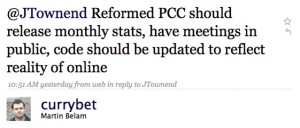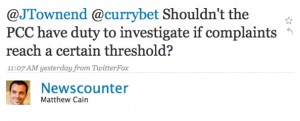Speaking on the Radio 4 Today programme, chair of the Press Complaints Commission [PCC], Sir Christopher Meyer, has disputed the Media Standards Trust’s new published research, labelling it a ‘shoddy report’. (Click through end link for full transcript)
The report has found that the PCC [as reported in Guardian, for example] lacks transparency and ‘commercially significant sanctions’.
Interviewed this morning, Sir Christopher Meyer defended the work of the PCC: ‘the way we organise ourselves is transparent,’ he said.
“They [the MST] don’t come to PCC and they don’t take evidence directly,” Meyer said.
Sir David Bell, who chairs the MST, said “We are more expert on their website than they [PCC] are themselves.”
Bell said the MST will consult the PCC in the second stage of the research.
“There’s a revolution going on in newspapers, the PCC needs to be reformed,” Bell added.
Meyer labelled the report’s findings as ‘statistics of the madhouse’. “We now have record numbers of people coming for advice,” Meyer said. “This has to be seen as a vote of confidence,” he said.
Full audio linked here: http://news.bbc.co.uk/today/hi/today/newsid_7878000/7878472.stm
0845 (Today Programme) from the website:
“Newspapers are regulated by the Press Complaints Commission, a body set up and run by the papers themselves. A report by the Media Standards Trust, an independent charity, says existing press self-regulation is not working. Sir David Bell, chairman of the trust, and Sir Christopher Meyer, chairman of the PCC, discuss the report.”
Continue reading →

